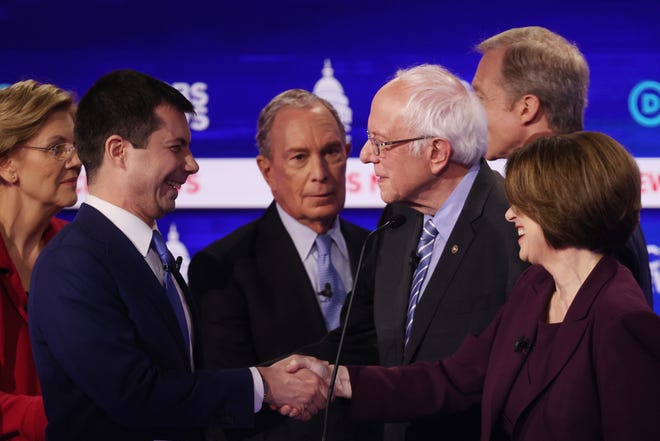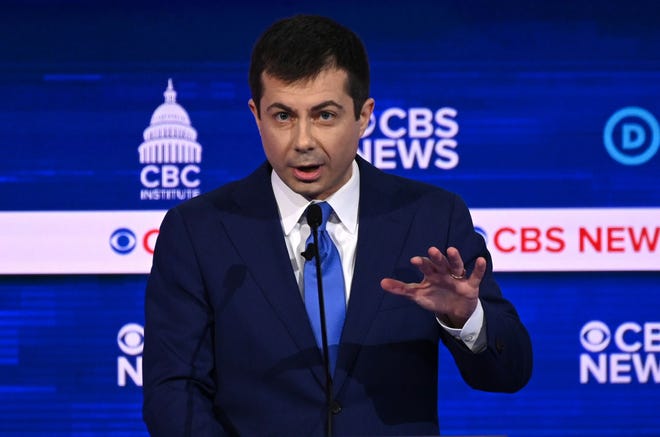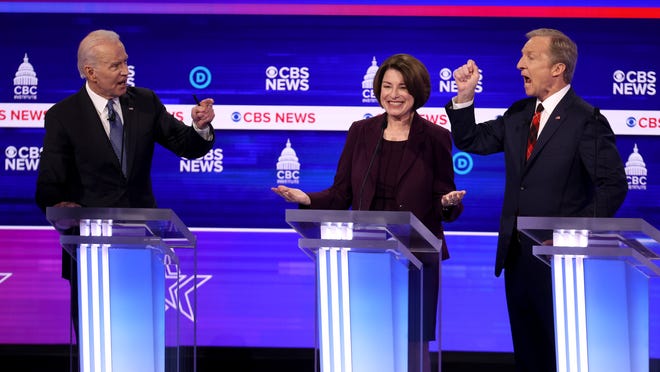WASHINGTON – After a resounding victory in South Carolina, the former vice-president Joe Biden has the impetus of a new primary winner behind him.
But with Super Tuesday in a few days, Senator Bernie Sanders is looking to extend his lead in the promised national delegates while political observers wonder: Does Biden have the fuel to catch up?
Biden’s victory on Saturday rocked what was once a February roller coaster, sometimes with two national delegate leaders, six candidates who achieved a top three ranking in at least one state, and an unprecedented count in the Iowa caucuses. And there is one more X factor.
Super Tuesday voters will find former New York mayor Mike Bloomberg on the country’s ballots for the first time. The results could reveal whether his nine-figure personal expenses earned him enough delegates to jockey for the nomination – or simply become the single largest political ad sponsor in history.
The candidates combined to spend $ 247 million on advertising in the states from Super Tuesday until Thursday, up from $ 30 million in 2016, according to the tracking firm. Advertising analytics.
The day is the most important in the primary calendar: 14 states and American Samoa will determine a third of the promised delegates – 1,344 of the 1,991 needed to win – at the National Democratic Convention in Milwaukee. By way of comparison, the first four competitions which attracted so much attention determined only 155 delegates.
A dominant performance by Sanders could make it almost impossible for the rivals to overshadow its number of delegates. But a solid second place from Biden could position him as the moderate alternative that could better challenge President Donald Trump in the fall, according to political experts.
Likewise, Bloomberg will look for a solid performance to compete with Biden as Sanders’ best moderate challenger, according to political experts.
Other candidates, such as Pete Buttigieg, must increase the number of their delegates to stay in search of fundraising and reporting. Three states voting Tuesday could give the home state candidates a boost: Vermont for Sanders, Massachusetts for Senator Elizabeth Warren and Minnesota for Senator Amy Klobuchar.
“What I’ve been saying for the past few weeks is: guys, calm down. It’s not done,” said Renee Cross, professor of political science at the University of Houston and principal of the Hobby School. of Public Affairs. “Obviously, the candidates are doing well in these early states. But it’s not over yet.”
Sanders in mind
Sanders took the lead in Biden in a national poll average on February 10 and has not looked back, according to summaries from FiveThirtyEight.com and RealClearPolitics.com. The average survey in the largest states of Super Tuesday shows Sanders in the lead everywhere except in the state of Klobuchar, Minnesota.
But Buttigieg narrowly won Iowa and Biden won South Carolina. Despite the polls, Sanders’ rivals are scrambling to dull his victories and take off the delegates from among a dozen states smaller than the headliners of California and Texas.
From when Bloomberg entered the race from November 25 to Thursday, it spent $ 539 million to cover the country with television, radio and digital ads, according to Advertising Analytics. By comparison, President Barack Obama’s entire campaign in 2008 spent approximately $ 730 million and President Donald Trump’s campaign in 2016 spent approximately $ 325 million.
But Bloomberg suffered a a widely criticized debate in Las Vegas and a lackluster appearance in Charleston, S.C. The results on Tuesday will reveal whether permanent damage has been done.
“Bloomberg’s decision to enter the debate was one of the biggest strategic mistakes in the cycle,” said Daron Shaw, government professor at the University of Texas at Austin.
Another billionaire, Tom Steyer, contributed $ 260 million to his campaign until the end of January, according to his report from the Federal Election Commission. He spent $ 186 million until Thursday on advertising, according to Advertising Analytics. But he failed to win enough votes for any delegate in the top three states and dropped out of the race on Saturday night.

15% support or nothing
The Democratic Party demands that candidates obtain at least 15% of state support to collect the delegates. This has the effect of rewarding the winners with a bigger boost, while eliminating the poor performers.
Bloomberg’s support hovers around 15% in many Super Tuesday survey averages, a line that will define its performance. The challenge is evident in Texas, where a survey by the Hobby School of Public Affairs at the University of Houston found that almost 84% of voters had seen the Bloomberg ad, but that only 13.4% of those surveyed in the whole state intended to vote for him.
“Texas could be the death knell for the Bloomberg campaign if it cannot reach the 15% statewide threshold,” said Mark Jones, chair of the department of political science at Rice University. . “If he wants to start accumulating delegates, he has to start in Texas.”
Grassroots vs money in the big states
California is the biggest prize in the primaries with 415 delegates. But the state is so large and populous, and advertising so expensive, that campaigning is a challenge.
“California is to the presidential campaigns what Russia is to the invading armies: a vast expanse that consumes enormous resources,” said Jack Pitney Jr., professor of politics at Claremont McKenna College. “Bernie can do it because he has grassroots support. Bloomberg can do it because it has money. “
Sanders’ campaign announced that it had 105 paid employees and 23 offices across the state. The team said it had knocked on over a million doors and made more than 5 million phone calls to Californian voters.
Meanwhile, Bloomberg and Steyer faced tens of millions of dollars in advertising. The candidates spent $ 105 million on advertising in California until Thursday, according to Advertising Analytics.
Steyer placed more ads until February 23 in seven California markets than Bloomberg – everywhere except San Francisco, according to analysis on Thursday by the Wesleyan Media Project.
“Clearly, Bloomberg and Steyer’s advertising spend is in a completely different league,” said Travis Ridout, co-director of the media project.
California poll averages have shown that Sanders has more than doubled the support of any rival. Sanders was supported by 33% of respondents, against Warren at almost 14%, Biden at 13% and Bloomberg at 11%, according to the survey summary until Friday on FiveThirtyEight.com.
When applicants visit the Golden State, it tends to be for fundraising rather than the Iowa and New Hampshire dating campaign.
“Even when candidates come here in person, it is largely to raise funds,” said Pitney, who said he had not received “a single piece of mail from many candidates” although it is registered without party preference. “Normal people are not allowed to participate in these events.”
But the candidates will appear near the finish line. Sanders has scheduled rallies in California on Sunday in Los Angeles – with comedians Dick Van Dyke and Sarah Silverman, and a performance by Public Enemy Radio – and in San Jose.
Buttigieg has scheduled a campaign shutdown in Chula Vista on Monday.
Biden, who focused last week on South Carolina, plans to travel to Texas on Monday and California on Tuesday.
Everything is bigger in Texas
Texas is another tantalizing goal, with 228 delegates representing the third largest total behind New York. But it is difficult for small campaigns to break up because about 2 million Democratic voters are spread across 19 media markets. Campaigning in Houston does not mean getting the message across in Dallas.
Bloomberg is expected to spend $ 50 million on television commercials in Texas by Tuesday, Jones said.
“Texas gives it a bigger advantage than any other state, other than California,” said Jones. “There should be a population here a little more open to the centrist message that Bloomberg presents.”
Democrats are paying more attention to the traditionally conservative state after former representative Beto O’Rourke got closer than expected to overthrow Senator Ted Cruz.
Sanders campaigned in four Texas cities after winning the Nevada caucuses. Thursday, Warren had a town hall in San Antonio. Buttigieg has scheduled a rally in Dallas on Sunday. Biden has scheduled the campaign to end in Houston and Dallas on Monday.
“Now suddenly the Democrats see our state as a good state to invest resources in,” said Cross.
Texas poll averages revealed on Friday that Sanders had the support of 26% of respondents, Biden 21%, Bloomberg 18% and Warren almost 13%, according to FiveThirtyEight. The Hobby School of Public Affairs survey of 1,352 likely Democratic voters found Sanders and Biden almost tied with around 22% of the vote. The survey was conducted from February 6 to 18 and included a 2.7-point margin of error.

Challenging small states
Applicants scoured small states looking for delegates with lighter traffic. North Carolina with 110 delegates and Virginia with 99 each hosted numerous events in the days leading up to Super Tuesday. But even small states have received attention.
Utah, with 29 delegates, was a convenient stopover for Buttigieg on February 17 and Bloomberg on February 20, leading to the Nevada caucuses next door. Since the state’s population is concentrated in Salt Lake City, a ruling there covers the main voters and provides television and journalistic coverage while Bloomberg covered the airwaves.
“You have touched a place and you have affected the entire population,” said Jim Curry, associate professor of political science at the University of Utah. “I think there is a sense of hopelessness among the other candidates they need to recruit as many delegates as possible if they want to beat Sanders at the national level.”
Colorado, with 67 delegates, caught the attention. Buttigieg held a rally for around 8,500 people in Denver on February 22 – while Nevada counted its votes. A time when a 9-year-old boy asked how to tell others that he was gay went viral.
Warren arrived in Denver the next day and spoke to approximately 4,000 people. One of the distinctions she made with Sanders was her support for the abolition of the systematic obstruction of the Senate, which in fact requires a super-majority of 60 votes to approve a disputed law.
“I want to go to Washington to make big structural changes,” she said.
Oklahoma City, in a state with 37 delegates, has become a political gathering place. Klobuchar held a rally there on February 23. Bloomberg hosted a vote-out event on Thursday and Buttigieg planned a visit on Monday.
Klobuchar took the trip in a 36-hour sprint after the Nevada caucus promoted rural issues such as agriculture, education and health care. In addition to North Dakota, which votes on March 10, it visited Minnesota with 75 delegates, Arkansas with 31 delegates and Oklahoma.
“One of his messages was about ensuring that states are not rejected as overflown states,” said Jeanette Mendez, professor of political science at Oklahoma State University, who attended Klobuchar’s speech in Oklahoma City and found the crowd “enthusiastic”.
Klobuchar’s campaign announced $ 4.2 million in television and digital advertising in California, Colorado, Massachusetts, Minnesota, Texas and Utah. She said Super Tuesday will race again due to the number of states involved.
“Why should I go out?” she asked reporters at Little Rock. “It’s not even a close call to me.”
Postal voting
Voting by mail could affect the campaign more than how votes are counted. The postmark deadline on Tuesday could delay results. But getting to voters early could also be an advantage.
Sanders crossed Texas the day after his victory in the Nevada caucuses, with stops in Austin, El Paso, Houston and San Antonio. The strategy could have helped him to block the votes during the advance vote, which took place from February 18 to 28, before the rivals mobilized.
“What Sanders did seemed to me really, really smart,” said Shaw.
But in Colorado, where voting is done entirely by mail, the candidates still had the chance to make a good impression. The state’s 3.4 million eligible voters submitted only 764,877 ballots as of February 25, according to the secretary of state.
In the largest county, Denver County, the Democrats returned 37,190 ballots on Wednesday with 161,116 unexpressed. Adams County Clerk, which spans a suburb north of Denver, announced on Wednesday that “many voters could wait until polling day to make their final choice and vote”.
“My feeling is that a lot of Democrats are waiting to make up their minds,” said Kenneth Bickers, acting chair of the department of political science at the University of Colorado at Boulder.
And after Super Tuesday?
Since Sanders is expected to win most states and delegates on Tuesday, the question is whether someone else could derail it before reaching Milwaukee. Warren remains a progressive rival. Voters will assess whether a moderate such as Biden, Bloomberg, Buttigieg or Klobuchar would be a better bet to challenge Sanders – and Trump.
“Biden is very well placed to be second,” said Jones. “He will have the firm claim of being the most viable candidate to prevent Bernie Sanders from winning the Democratic nomination.”
The question is therefore when the candidates will give up. Bloomberg said he would continue to spend to defeat Trump, regardless of the candidate. But funding for others could dry up with poor performance.
Despite this, the candidates impatiently await the March 10 competitions. Buttigieg has a town hall Tuesday in Warren, Michigan. Warren has staff in Washington State aligned with advertising. Klobuchar campaigned in North Dakota.
“If there is no sorting, it’s like a Tarantino movie where everyone has a gun pointed at someone else’s head,” said Shaw. “Who will go first?”













